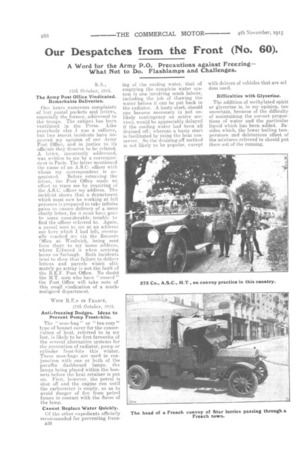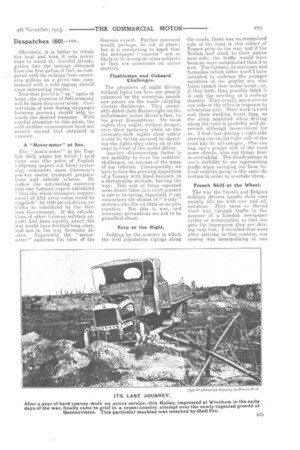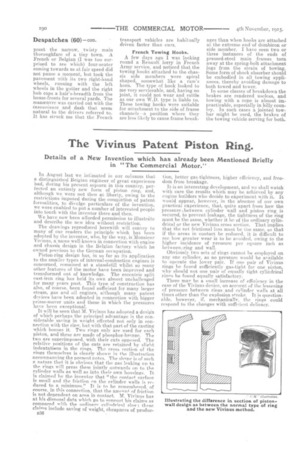Our Despatches from the Front (No. 60).
Page 8

Page 9

Page 10

If you've noticed an error in this article please click here to report it so we can fix it.
A Word for the Army P.O. Precautions against Freezing— What Not to Do. Flashlamps and Challenges.
5. A.,
15th October, 1915, The Army Post Office Vindicated. Remarkable Deliveries.
One hears numerous complaints of lost postal packets and letters, especially the former. addressed to the troops. The su6ject, has been ventilated in the Press. Like everybody else I was a sufferer, but two remit incidents have improved my opinion of our Army Post Office, and in justice to its officials they deserve to be related. A letter, incorrectly addressed, was written to me by a correspondent in Paris. The letter mentioned the name of an A.S.C. officer with whom my correspondent is ac
quainted. Before returning the letter, the Post Office made an effort to trace me by inquiring of the A.S.C. officer my address. The incident shows that a department which must now be working at full pressure is prepared to take infinite pains to ensure delivery of a mere chatty letter, for it must have gon,e, to some considerable trouble to find the officer referred .to. Again,
parcel sent to me at an address out here which I had left, eventually reached me via the Records r)ffice at Woolwich, being sent from there to my home address, where 11found it when arriving home onlnrlough. Both incidents tend to show that failure to deliver letters and parcels which ultimately go astray is not the fault of the B.E.F. Post Office. No doubt the M.T. men who have "cussed " the Post Office will take note of this small vindication of a muchffialigned department.
WITH R.F.s IN FRANCE, 17th October, 1f )15.
Anti-freezing Dodges. Ideas to Prevent Pump Frost-bite.
The " nose-bag " or " tea-cosy " type of bonnet cover for the conservation of heat, referred to in my last, is likely to be first favourite of the several alternative systems for the prevention of radiator, pump or cylinder frost-bite this winter. These nose-bags are used in conjunction with one or both of the paraffin dashboard lamps, the lamps being placed within the bonnets before the heat retainer is put on. First, however, the petrol is shut off and the engine run until the carburetter is empty. so a,s to avoid danger of fire from petrol fumes in contact with the flame of the lamp.
Cannot Replace Water Quickly.
Of the other expedients officially recommended for preventing freezB30 lag of the cooling water, that of emptying the complete water system is one involving much labour, including the job of thawing the water before it can be put back in the radiator. A hasty start, should one become necessary (a not unlikely contingency on active • ser vice), would be appreciably delayed if the cooling water had been all drained off ; whereas a hasty start is facilitated by using the heat conserver. So the draining-off method is not likely to be popular, except with drivers of vehicles that are eel dam used.
Difficulties with Glycerine The addition of methylated spirit or glycerine is, in my opinion, too uncertain, because of the difficulty of maintaining the correct proportions of water and the particular liquid which has been added. Besides which, the lower boiling temperature and deleterious effect of the mixtures referred to should put them out of the running. Obviously, it is better to retain the heat and turn it into power than to waste it. Careful investi. gation into the mileage obtained from the first gallon of fuel, as compared with the mileage from successive gallons on a given run, commenced with a cold engine, should show interesting results. Now that petrol is " up " again at home, the question of fuel economy will be more than ever acute. Conservation of heat during stoppages between journeys should help towards the desired economy. With careful attention to this point, the cold-weather consumption need not greatly exceed that obtained in summer.
A "Motor-noter" at Sea.
The " motor-noter " in the English daily paper for which I paid three sous (the price of English halfpenny papers out here) yesterday, comments upon Germany's pre-war motor transport preparations and subsidy scheme. He makes the astounding assertion that one German expert calculated " that the whole transport requirements of fifty army corps could be supplied" by 1000 petrel-driven vehicles as subsidized by the German Government. If the calculations of other German military experts had been equally exact, the war would have finished long since, and not in the way Germany desires. Apparently the " motornoter " endorses the view of the
German expert. Further comment . would, perhaps, be out of place ; but it is comforting to know that the newspaper " experts" are as likely to be wrong on other subjects as they are sometimes on motor matters.
Flashlamps and Unheard Challenges.
The pleasures of night driving without lights out here are greatly enhanced by the numerous people One passes on the roads carrying electric flashiarnps. They invariably direct their flashes right on the unfortunate motor driver's face, to his great discomfiture. On most nights they might, without danger, save their batteries, while on the intensely-dark nights their safety would be better ensured by directing the lights they carry on to the road in front of the motor driver.
Another disconcerting factor is our inability to hear the sentries' challenges, on account of the noise of our vehicles. Consequently, we have to face the pleasing apparition of a Tommy with fixed bayonet, in a threatening attitude, barring the way. This sort of thing repeated some dozen times in a short journey is apt to be trying, especially if one remembers the stories of " windy " sentries who fire on little or no provocation. But this is war, and necessary precautions are not to be grumbled about.
Keep to the Right.
Judging by the manner in which the civil population zigzags along the roads, there was no recognized rule of the road in this corner of France prior to the war, and if the British had stuck to their native near-side, the traffic would have been no more complicated than it is now. The farmers, farmeresses and farmelles (which latter word I have invented to embrace the younger members of the gentler sex who farm) cannot hear motor horns ; or, if they hear, they possibly think it is only the newsboy or a railway shunter. .They usually move over to one side or the other in response to a fearsome yell. Their work is hard and their working hours long, so the sleep snatched when driving along the road is probably well deserved, although inconvenient for us. I find that driving a right-side steering car on the right side of the road has its advantages. One can hug one's proper side of the road more closely, also cut things finer in overtaking. The disadvantage is one's inability to see approaching traffic when swinging out from behind vehicles going in the same direction in order to overtake them.
French Skill at the Wheel.
The way the French and Belgian military drivers handle their cars usually fills me with awe and admiration. They seem to thread their way through traffic in the manner of a London newspaper cyclist or motorcyclist, so that one gets the impression they are driving very fast. I recollect that soon after arriving in this country, our convoy was monopolizing at one point the narrow, twisty main thoroughfare of a tiny town. A French or Belgian (I was too surprised to see which) four-seater coming towards us at fair speed did not pause a moment, but took the pavement with its two right-hand wheels, running with the left wheels in the gutter and the right hub caps a hair's-breadth from the house-fronts for several yards. The manceuvre was carried out with the insouciance and dash that seem natural to the drivers referred to. It. has struck me that the French
transport vehicles are habitually driven faster than ours.
French Towing Hooks.
A few days ago I was looking round a Renault lorry in French Army service, and noticed that the towing hooks attached to the chassis side members were spiral shaped, somewhat like a ram's horn. The type of hook looked to me very serviceable, and, having no joint, it could not wear and rattle as our own W.D. type is liable to. These towing hooks were suitable for attachment to the side of frame channels---a position where they are less likely to cause frame break ages than when hooks are attached at the extreme end.of-ditnibiron or side member. I have seen two or three instances of the ends of pressed-steel main frames torn. away at the spring-bolt attachment lugs from the strain of towing. Some form of shock absorber should be embodied in all towing appliances, thereby avoiding damage to both towed and tower.
In some classes of breakdown the brakes are rendered useless, and towing -with a rope is almost impracticable, especially in hilly country. In such cases a jointed towbar might be used, the brakes of the towing vehicle serving for both.




















